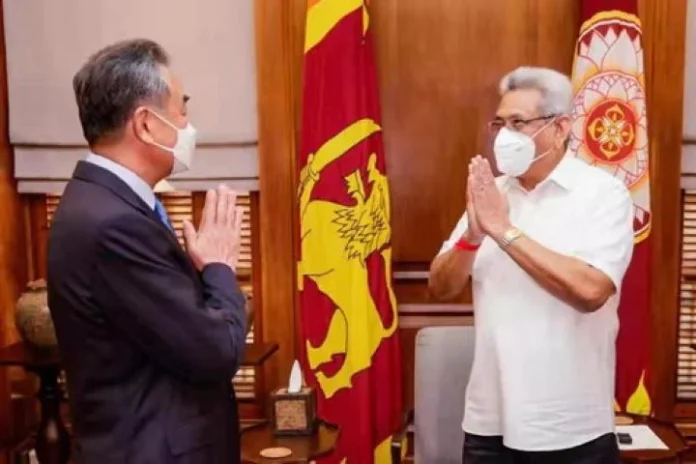Sri Lanka is on the way to economic, social, and political turmoil. The country’s freebies and its partnership with China are known to be responsible for this. Unsurprisingly, the communist nation claiming to be one of Sri Lanka’s best allies has helped in stabilising the population by aiding them to function by trapping them in their debt.
The social unrest
There was an outcry on the challenges being faced by the people on July 9 in Colombo, Sri Lanka’s capital. Numerous protesters broke the police barricades and stormed the official residence of President Gotabaya Rajapaksa. As a result, the President informed the speaker that he would resign on July 13. Even Prime Minister Ranil Wickremesinghe stated that he’d make way for an all-party government by resigning. However, till the next cabinet is appointed, he will continue to serve as the Prime Minister.
The police officers and army personnel failed to control the protesters demanding Rajapaksa’s resignation. They blamed him for creating the worst economic crisis in the past few decades.
According to sources, thousands of protesters surrounded the President’s house, some draped in the national flag, gathered in rooms and corridors. People were also seen in the swimming pool, while others sat on sofas and a four-poster bed. However, as a safety precaution, the President left his residence before the protests started.
Later, on Saturday, a huge fire and smoke were seen coming from the Prime Minister’s private home in an affluent neighbourhood in Colombo. His office claimed that the protesters were responsible for the fire.
What were the contributors to this crisis?
Sri Lanka has been under a soaring food crisis, inflation, power outages, fuel shortage, and many more issues for a while now, which resulted in the Sri Lankans getting infuriated. The incompetence of the political authorities to handle the rocky state of its economy further led to anarchy.
According to Asian Development Bank, the national income of Sri Lanka exceeds its national expenditure. It does not produce adequate tradeable goods which could increase its revenue. Freeloading was hence a big factor in starting this crisis.
In addition, the economic crisis after the pandemic further pushed the country into utter despair. It shook its tourism-reliant economy and slashed the overseas workers’ remittances. Shortly after, Credit agencies started to downgrade Sri Lanka. The capital market was now unwilling to invest in Sri Lanka. In no time, its Forex Reserve plummeted. With hefty government debt, rising oil prices, as well as a ban on the import of chemical fertilizers last year that devastated agriculture, Sri Lanka went into a more dilapidated state. School closures and rationing of diesel and petrol for essential services were propelled by the stopping of fuel shipments. The deep tax cuts promised by the President during a 2019 election campaign also wiped out parts of the Sri Lankan economy.
Amid all these difficulties, the government knocked on the doors of the IMF for assistance. But with this, Sri Lanka steeply devalued its currency in no time, further stoking inflation and adding to the pain of the public.
How did China enter the scene?
China saw this crisis as an opportunity to hold its economy hostage and get a strategic edge over the country. The communist nation offered loans with hefty interest to the already impoverished nation. Its financial and economic aid was just some tools to gain some leverage over its politics and security and use it against India.
China spent 95% of its income on unbalancing the Sri Lankan economy to disarm it economically. This showcases China’s desperateness as it kept adding insult to injury. China initially made use of hefty loans to attract the Sri Lankan government, but soon betrayed it by engulfing the economy, and forcing the country into a severe debt trap.
– The writer is an Aerospace and Defence Analyst & Director ADD Engineering Components (India) Pvt Ltd (An Indo- German Company). The views expressed are of the author and do not necessarily reflect the views of Raksha Anirveda
-The author is a Defence, Aerospace & Political Analyst based in Bengaluru. He is also Director of ADD Engineering Components, India, Pvt. Ltd, a subsidiary of ADD Engineering GmbH, Germany. You can reach him at: girishlinganna@gmail.com. The views expressed are personal and do not necessarily carry the views of Raksha Anirveda






